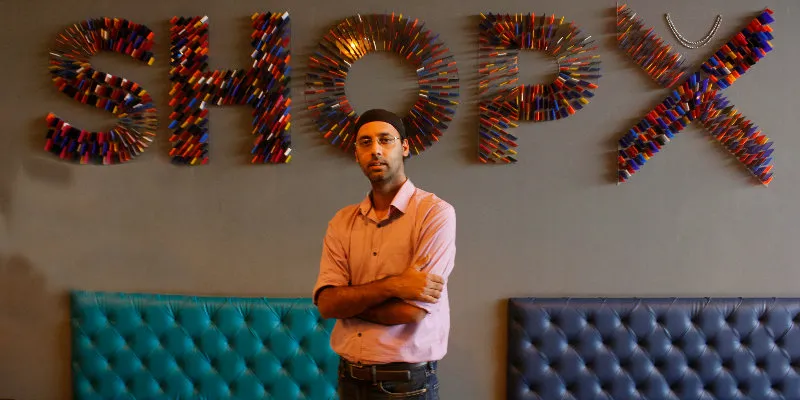Has ShopX cracked the unit economics code?
In one year of its existence, ShopX has empowered 40,000 retailers across 200 towns in 10 states. Based in Bengaluru, the technology startup aims to provide the 600-million middle-income population in India (as against the current 50 million active internet buyer base) access to digital commerce. The ShopX retail app enables retailers to offer products and services to their customers by listing the products and daily deals.
"We want to focus on unit economics by reducing the cost of customer acquisition, customer retention, customer service, deep discounting, logistics, and cash on delivery,” says Amit Sharma, Co-founder of ShopX.
An MBA from University of California, Los Angeles, Amit holds two international patents.

Changing the economics of digital commerce
After working as a technical specialist at Infosys Technologies for more than three years, Amit co-founded Go Untucked (which creates T-shirts for the Indian market). Being in the e-commerce business, Amit noticed that it contributes only 1.4 percent to the Indian economy, whereas the offline retail sector contributes six to seven percent.
About 80–85 percent of the American economy is served by large format retailers. However, Amit says that the Indian economy will never witness such a phenomenon. Moreover, e-commerce is also facing fundamental unit economic challenges.
To redefine the rules of digital commerce, Amit and Apoorva Jois came up with the idea of 10i Commerce (which owns ShopX) in May 2015 . Apoorva brings more than 16 years of experience in retail technology and management with global Fortune 500 businesses.
Having worked together at Infosys, Amit and Apoorva have been friends for about 13 years. Apoorva has also worked with Amit in his previous startup.
They raised $5 million from Infosys Co-founder Nandan Nilekani, which according to Amit served as both seed capital and mentorship. He also stressed upon moulding ShopX as an efficient technology-driven model where money is not burnt on just expansion. There are 1.2 crore retailers in India, and ShopX can easily rope them all in by spending money. But keeping unit economics in mind, the startup plans to reach five lakh retailers by next year and 10 lakh in 2018.
Building technology
Along with capital efficiency, Amit also believed that building a coherent technology would help them stay ahead of the game. So here comes the role of ‘Smart Technology’, a retail network management app which manages day-to-day transactions between all the members in the retail network. It monitors real-time money transaction, order performance, and first to last mile logistic management.
Amit said,
The Smart technology is typically used to onboard retailers, select the store type, and ensure a certain gap between selected stores in a given city. We collect the right information about them like identity, Aadhaar card, photograph, location, and the app catches latitude and longitude of the store. The app also maintains the retailers’ account, receivable and credit, debit and ledgers.”
Bhoopendra Singh, a Bengaluru-based retailer, said that since he has been working with ShopX, his business has increased by 30 percent. And the consumers’ footfall have also increased by 30-40 percent.
ShopX's customer app allows customers to browse through the list of products in their nearest retail store. The app even enables users to place orders offline and view great deals and offers. ShopX manages the logistics and has tied up with BlueDart and FedEx.
“We have reduced the delivery cost to Rs 75 from Rs 130 in tier-2 and tier-3 cities (what the large e-commerce companies spend). There is no customer acquisition cost. The retailer does the initial marketing for us by introducing our platform to their regular customers,” said Amit.
Revenue model
ShopX generates revenue on the marketplace side and gives some of that to the retailers, keeping the rest as margins. Amit claims that the profitability number of ShopX is 60–80 percent, better than traditional digital commerce.
At present, ShopX has a GMV of Rs 100 crore, with a month-on-month revenue growth of 100 percent. It's prepaid model allows retailers to deposit cash in a wallet. The startup has more than 100 brands in its portfolio, including Patanjali, Samsung, Micromax, Karbon, Lava, Levi’s, and Puma.
At present, ShopX performs more than 20,000 digital and physical transactions a day. With a team of 100 members, it aims to reach more than five lakh retailers by 2017.
Market overview
The Ministry of Micro, Small and Medium Enterprises reported that there are 36 million small units in India. Most of them are buyers and sellers of various industrial goods contributing to the growth of B2B e-commerce. According to consultant firm Ecumen.in, the B2B segment in India is set to grow 2.5 times and is expected to touch Rs 45 lakh crore by 2020.
To address the growth of this market, a few startups have emerged in the past few years. Delhi-based Industrybuying.com is an online marketplace selling industrial products to SMEs as well as large businesses. In January, it raised Rs 12 crore. Bengaluru-based StoreKing, leveraging the power of the vernacular, has introduced more than one million villagers to the world of online shopping. Gurgaon-based Power2SME is an online buying platform that caters to manufacturers for the supply of steel, chemicals, and polymers.
Website: ShopX







